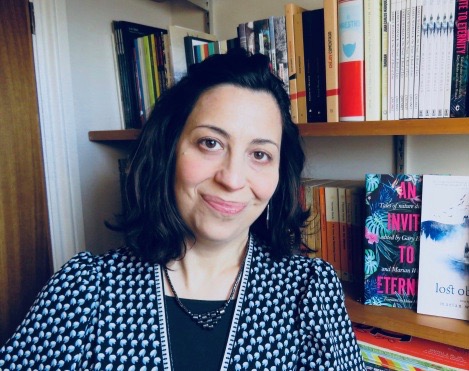
My first time reading Marian Womack‘s work came via the collection Lost Objects, an unsettling array of speculative fiction informed by climate change in multiple unsettling ways. (I interviewed her about it in 2018.) This year will see the release of her novel, The Golden Key — but first, Womack has another literary project that she’s ushered into the world, an anthology co-edited with Gary Budden. This is An Invite to Eternity, which includes stories from Kristen Roupenian, Aliya Whiteley, and Naomi Booth. It’s also the first book from Calque Press, a new independent publisher. I talked with Womack about the anthology, the press, and the uncanny boundaries of ecological fiction.
Early on in An Invite to Eternity, there’s a discussion of the difficulty of pinning down a specific definition of ecological fiction. How did you settle on what would or would not be within the boundaries of this genre?
I hope that the book itself, not just by its ToC and list of authors, but by the way in which they have all engaged with the ideas we wanted to talk about, shows that we have been fairly wide ranging about what we consider to belong to the genre. We do have a number of ideological concerns for the book: we weren’t openly looking for straight down-the-line realist fiction, although a number of contributors cleave closer to the realist mode rather than our preferred speculative approaches. Ecological fiction, as we defined it broadly, is fiction that engages with the fact that the world as we know it is coming / has come to an end: we both have a strong bias towards the idea that the best way to communicate the crisis or provoke action about it is via non-realist approaches. Our definitions are open and flexible.
What was your process like as far as co-editing this anthology was concerned? Did you and Gary Budden each take certain areas?
Yes. Gary dealt with the authors writing in English as their native language, and I dealt with the rest: the self-translators, the translated fiction, the writers in their second or third or fourth languages.
How did the two of you first come to work on this project?
When I read Gary’s debut collection, Hollow Shores, and also with his novella, The White Heron Beneath the Reactor, I was moved by his depiction of place and landscape. I could see we were both working within similar parameters, but my approach in Lost Objects was more towards the speculative side of ecopoetics. We both saw that, by combining both approaches, we could edit quite a varied anthology, that spoke to our concerns about communicating the climate crisis. The situation at the moment is so desperate that any way of increasing general awareness is to be welcomed, and all approaches have things to recommend them.
An Invite to Eternity balances work in translation with Anglophone writings. Did you know from the outset that you wanted a global focus for the anthology?
Yes, we wanted to be global and also open to newer writing: I think the thing that I like most about the anthology is that we have included both established authors (Camilla Grudova, Anna Starobinets, Aliya Whitely) and writers who are at an earlier stage in their careers, and that it doesn’t matter where they are from or how much work they have published previously. Rather than globalism, I would say internationalism: the climate emergency affect us all, and we need as many voices as possible to be heard in their own words.
This anthology is the first title from Calque Press. What prompted you to have this as the first book from it? And what are your overall goals with this new imprint?
Our remit is translation, poetry and nature, which can sound quite ambitious; but it really speaks to the interests of me and my partner in the imprint, the poet James Womack. It mirrors a little what we did in Spain for nearly a decade with our previous publishing house Ediciones Nevsky: our major interest was to discover new writers, both in translation and not in translation, to Spanish audiences. Our success was limited: the Spanish public was not always interested in reading someone they had never heard of. We are hoping that the approach is more welcome in the English speaking world. One thing we never did in Spain was publish poetry, although we really wanted to. Our Spanish distributor looked at us like we were proposing something slightly distasteful. Working in a slightly different way here in the UK, we feel much freer when it comes to deciding what we publish. We can coordinate the collection in much closer accord to our prejudices and whims. Nature, broadly defined, is the collection that I will personally coordinate.
What would you say makes speculative and horror fiction so suited to addressing questions of climate change?
We live in highly surreal times; but it is more than that. You need a moment of shock, a moment of sublimity, to engage with the climate crisis. Speculative fiction can offer that door into the familiar-unfamiliar, allowing us to experience climate change viscerally. I personally believe that speculative fiction can teach us more about our world than realist fiction: it’s a genre that is more open to allegory and analogy, and so the reader isn’t thinking about how closely what is being described maps onto her own experience, but rather about the general intellectual context of the worlds that are developed and described. And, as far as horror is concerned, everything is horror at the moment, from the news to the weather: it would look a little odd not to open spaces to the unsettling, the uncanny, the hair-raising.
Follow Vol. 1 Brooklyn on Twitter, Facebook, and sign up for our mailing list.
